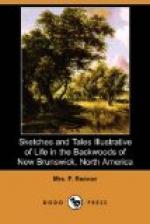country, where white as well as red were recipients
of England’s bounty, and many a tale of wild
pathos or dark horror has he told of the experience
of his youth with the people of the wild. In
New Brunswick his days had passed more peacefully.
He sat this evening with his chair poised in that
aerial position on one leg which none but an American
can attain. Ambitious emigrants, wishing to be
thought cute, attempt this delicate point of Yankee
character, but their awkwardness falling short of
the easy swing necessary for the purpose, often brings
them to the ground. A beautiful English cherry
tree, with its snowy wreathes in full blow, stood before
him; he had raised it from the seed, and loved to
look upon it. It had evidently been the object
of his meditations, and served him now as a type wherewith
to illustrate his remarks respecting the meeting we
had attended—like those professors of religion
we to-day heard, he said, was his beautiful cherry
tree. It gave forth fair green leaves of promise
and bright truth-seeming blossoms, but in summer, when
he sought for fruit there was none; and false as it,
were they of words so fair and deeds so dark, and
he’d “double sooner trust one who laughed
more and prayed less, than those same whining preachers.”
This was the old man’s opinion, not only respecting
the baptists, but all other sects as well. What
his own ideas of religion were I never could make out.
Universalism I fancied it was, but differing much from
the theories of those evanescent preachers who sometimes
flashed like meteors through the land, leaving doubt
and recklessness in their path. The first truths
of Christianity had been imparted to him, and these,
mingling with his own innate ideas of veneration,
formed his faith; as original, though more lofty in
its aspirations, than the wild Indian’s who tells
of the flowery land of souls where the good spirit
dwells, and where buffalo and deer forsake not the
hunting grounds of the blessed. He held no outward
form or right of sanctity. The ceremony which
bound him to his wife was simply legal, having been
read over by the nearest magistrate. His children
were unbaptised, and the green graves of his household
were in his own field, although a public burying-ground
was by the meeting-house of the settlement.
Meanwhile the old lady, who had hailed our advent
with the hospitality of her country, set about preparing
our entertainment. Tradition says of the puritans,
the pilgrims of New England, that when they first stood
on Plymouth Rock, on their first arrival from Europe,
they bore the bible under one arm and a cookery book
under the other. Now, as to their descendants,
the refugees, I am not exactly sure if, when they
pilgrimised to New Brunswick, they were so careful
of the bible, but I am certain they retain the precepts
of the cookery book, and love to embody them when
they may. Soon as a guest comes within ken of
a blue nose, the delightful operations commence.
The poorer class shifting with Johnny-cake and pumpkin,
while, with the better off, the airy phantoms of custard
and curls, which flit through their brains, are called
into tangible existence. The air is impregnated
with allspice and nutmeg—apple “sarce”
and cranberry “persarves” become visible,
while sal-a-ratus and molasses are evidently in the
ascendant.




